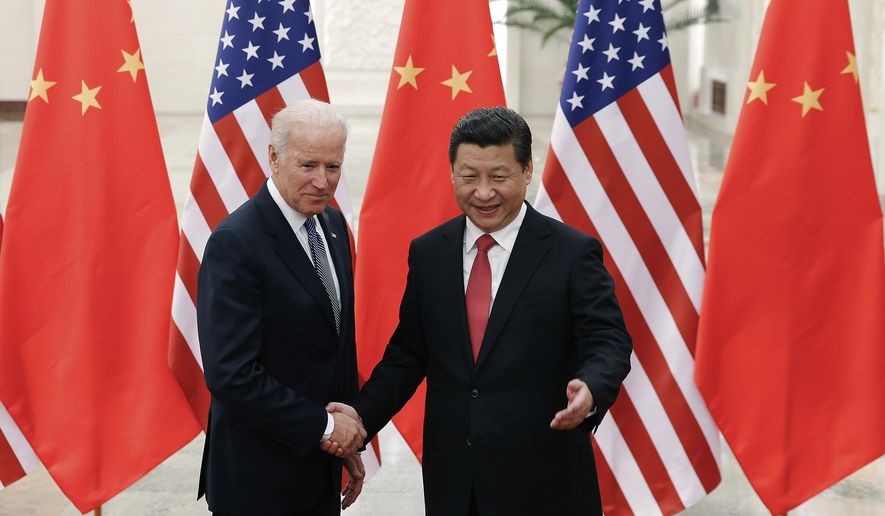Happy holidays! Welcome to Threat Status, our weekly roundup of the biggest news inside the Pentagon, on the southern border, and around the world. Sign up to receive Threat Status each week from a national security reporting team headed by veteran Washington Times journalists Ben Wolfgang and Guy Taylor.
We’re keeping a close eye on the Chinese Communist Party’s concerted effort to spread its message and influence around the world, from Japan to the U.S. Washington Times National Security Correspondent Bill Gertz details how key legislation moving through Congress will require American intelligence agencies to produce comprehensive reports on Chinese influence operations in the U.S., including those on social media and in popular news outlets. The Times is also tracking an apparent effort by Beijing and its political allies in Japan to exploit last summer’s assassination of former Japanese Prime Minister Shinzo Abe and use it as a tool to chip away at religious freedom in the country.
Pivot to Asia (again)

After they take control of the chamber next month, House Republicans say they’ll confront China’s growing economic, political and military power head-on. Key members of the GOP leadership team say the Biden administration — like the Obama and Trump administrations before it — hasn’t gone far enough to shift America’s attention to China or to develop a robust military plan to help Taiwan defend itself from a Chinese invasion.
Rep. Mike Gallagher will be at the center of those efforts. The Wisconsin Republican and proposed incoming chair of the House’s new Select Committee on China talked exclusively to Washington Times Military Correspondent Ben Wolfgang and Capitol Hill reporter Mica Soellner about his plans for the committee and his fear that the U.S. is “ waking up too slowly” to the threats posed by China.
China represents the greatest long-term challenge for the U.S., but there may be more immediate risks in the Pacific. Washington Times National Security Team Leader Guy Taylor explains how the Biden administration is crossing its fingers North Korea won’t move ahead with a nuclear-weapons test, which experts fear may be on the horizon. In another provocative move, Pyongyang last week tested a new ICBM engine in a key step forward in its five-year plan to develop a dangerous strategic weapons system.
’Border nightmare’
 <
<
Closer to home, the unfolding crisis at the U.S.-Mexico border is taking center stage in the looming 2024 presidential campaign and in the courtroom. The Times’ Stephen Dinan offers an in-depth look at the fight over the federal government’s Title 42 deportation policy, which will remain in effect after a last-minute move by Supreme Court Chief Justice John G. Roberts Jr. to keep it in place just a day before its expiration date.
The crush of illegal immigrants at the border is shaping up to be a major political liability for President Biden. Former President Trump, who has already announced his own 2024 bid, took direct aim at Mr. Biden this week over his handling of the crisis and proposed making the Title 42 policy — which allows the government to quickly expel migrants at the border during a public health emergency — permanent.
Patriot showdown

Russia’s war in Ukraine has almost reached its 10th month, and tensions between Washington and Moscow are rising with each day the conflict drags on. Pentagon correspondent Mike Glenn is watching the war from every angle, including U.S. plans to send Patriot missile defense systems to Ukraine to help fend off Moscow’s brutal bombing campaign on Ukrainian energy infrastructure. Ukrainian President Volodymyr Zelenskyy is scheduled to meet President Biden at the White House on Wednesday, where Mr. Biden will announce that the U.S. will provide the war-torn country with the Patriot surface-to-air missiles.
The Kremlin didn’t appreciate the news. Russian leaders warned before the announcement that the U.S. faces “unpredictable consequences” if it goes ahead with the Patriot delivery, stoking fears that Russian President Vladimir Putin may be willing to start a war with the West.
In our opinion

If you think such stark threats from Moscow sound eerily reminiscent of doomsday Cold War-era rhetoric, you’re not alone. The Times’ Editorial Board noted this week that after decades of relative calm on the nuclear front, there is once again the very real possibility that the world’s most dangerous weapons could be unleashed. And Russia may be feeling emboldened in other arenas as well. In a column for The Times, Centennial Institute fellow Gregory J. Moore argues that the Biden administration bowed to Moscow’s “hostage diplomacy” in its decision to trade imprisoned women’s basketball star Brittney Griner for infamous Russian arms dealer and “Merchant of Death” Viktor Bout.
It’s a dangerous moment for mankind, but let’s not forget about the men and women who keep our country safe. Their sacrifices — and the sacrifices of their families — should be top of mind for us all this holiday season, former Wisconsin Gov. Scott Walker writes.
Thanks for reading Threat Status. Don’t forget to sign up here and get it delivered to your inbox each week. And if you’ve got questions, Ben Wolfgang and Guy Taylor are here to answer them.
• Guy Taylor can be reached at gtaylor@washingtontimes.com.
• Ben Wolfgang can be reached at bwolfgang@washingtontimes.com.




Please read our comment policy before commenting.